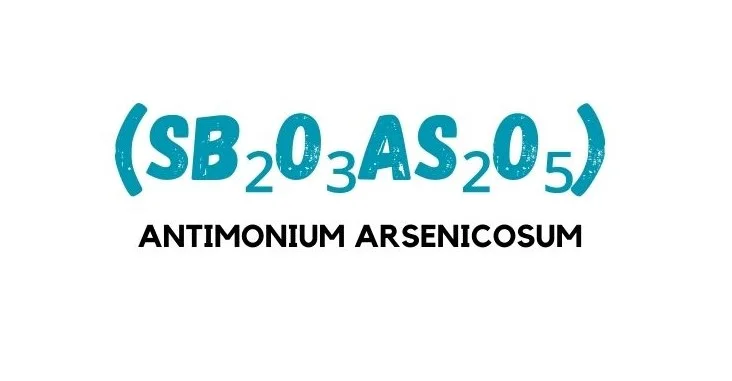Antimonium Arsenicosum is an Arseniate of Antimony, extensively recommended for emphysema, particularly by the authority Hearer.
PROVER
- Isnard

Table of Contents
ToggleSOURCE INFORMATION
- Arseniate of Antimony (Sb₂O₃As₂O₅).
- It is a chemical compound with the molecular formula Sb₂O₃As₂O₅. It is composed of antimony (Sb), oxygen (O), and arsenic (As).
- The compound is formed by the combination of antimony trioxide (Sb₂O₃) and arsenic pentoxide (As₂O₅).
Chemical Composition
- Sb₂O₃As₂O₅ consists of antimony in the +3 oxidation state (Sb³⁺) and arsenic in the +5 oxidation state (As⁵⁺).
Properties
- The compound may have specific physical and chemical properties based on its molecular structure, which includes characteristics of both antimony trioxide and arsenic pentoxide.
Occurrence
- Arseniate of Antimony is not a naturally occurring mineral but rather a synthetic compound produced through specific chemical reactions.
Uses
- The uses of this compound are not as widely documented as some other antimony or arsenic compounds. It may have applications in chemical research or industrial processes where its specific properties are advantageous.
CLINICAL INSIGHTS
- Dr. N.M. Chowdhury recommends Antimonium Arsenicosum after pneumonia and pleurisy, especially when acute symptoms have subsided, and dyspnea persists.
CLINICAL APPLICATIONS
- Respiratory Conditions
- Effective in emphysema, characterized by excessive dyspnea, persistent cough, and increased mucous secretion.
- Symptoms worsen while eating and lying down.
- Notable efficacy in catarrhal pneumonia associated with influenza.
- Addressing after-effects of pleurisy, especially on the left side, with exudation.
- Cardiac Health
- Indicated for myocarditis and cardiac weakness, contributing to a sense of weakness in the individual.
- Ocular and Facial Affections
- Useful in inflammation of the eyes and edema of the face.
DOSAGE
- Third trituration.
FAQs (Frequently Asked Questions)
What are the primary applications of Antimonium Arsenicosum?
- The key uses include addressing emphysema, catarrhal pneumonia, after-effects of pleurisy, and cardiac weakness.
How does Antimonium Arsenicosum affect respiratory health?
- It proves beneficial in emphysema with symptoms like excessive dyspnea and cough, worsened by eating and lying down.
What is the recommended dosage of Antimonium Arsenicosum?
- The suggested dosage is the third trituration.
In which cases can Antimonium Arsenicosum be considered after pneumonia and pleurisy?
- Antimonium Arsenicosum may be useful when acute symptoms have subsided, and dyspnea persists after pneumonia and pleurisy.
